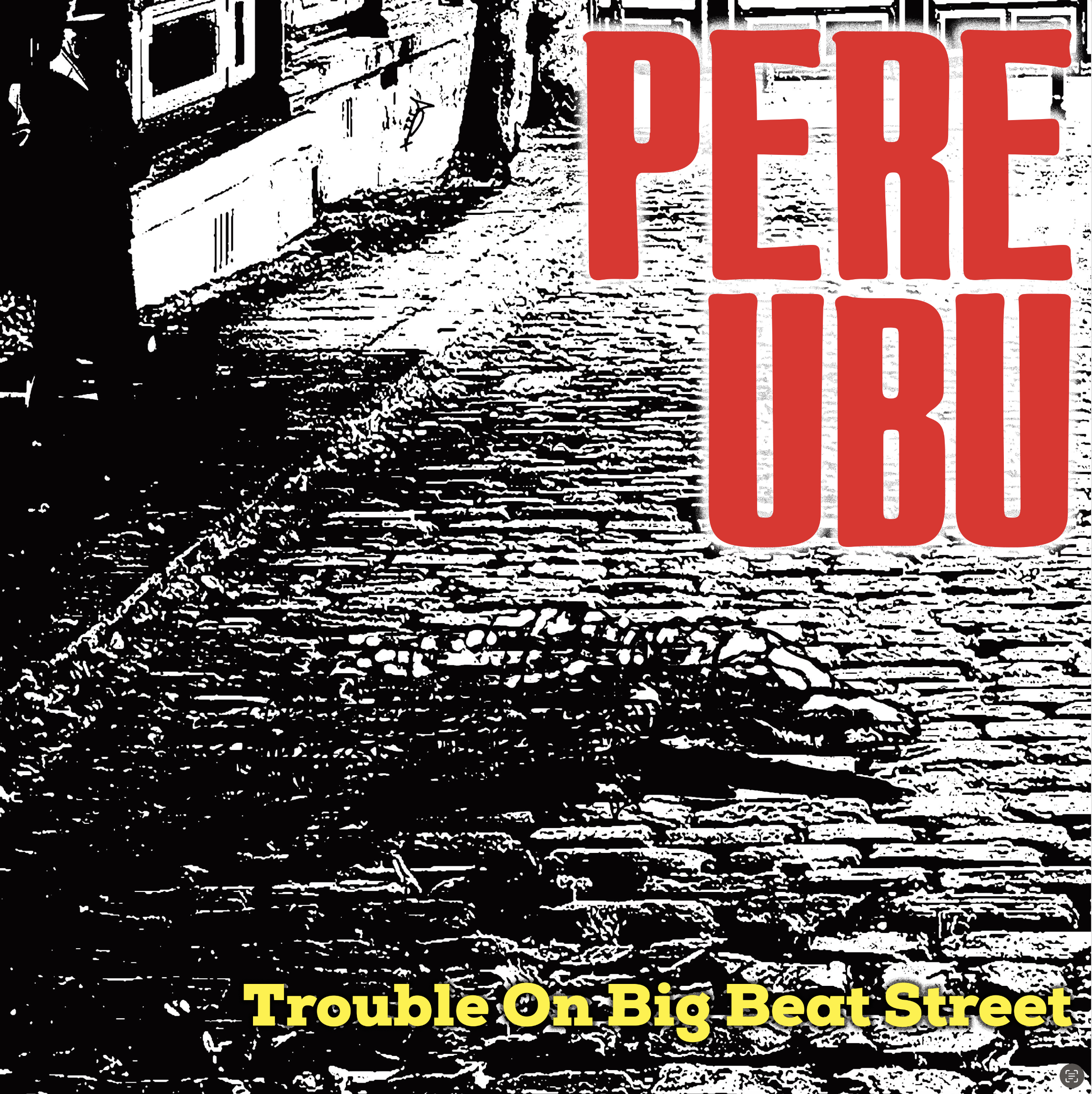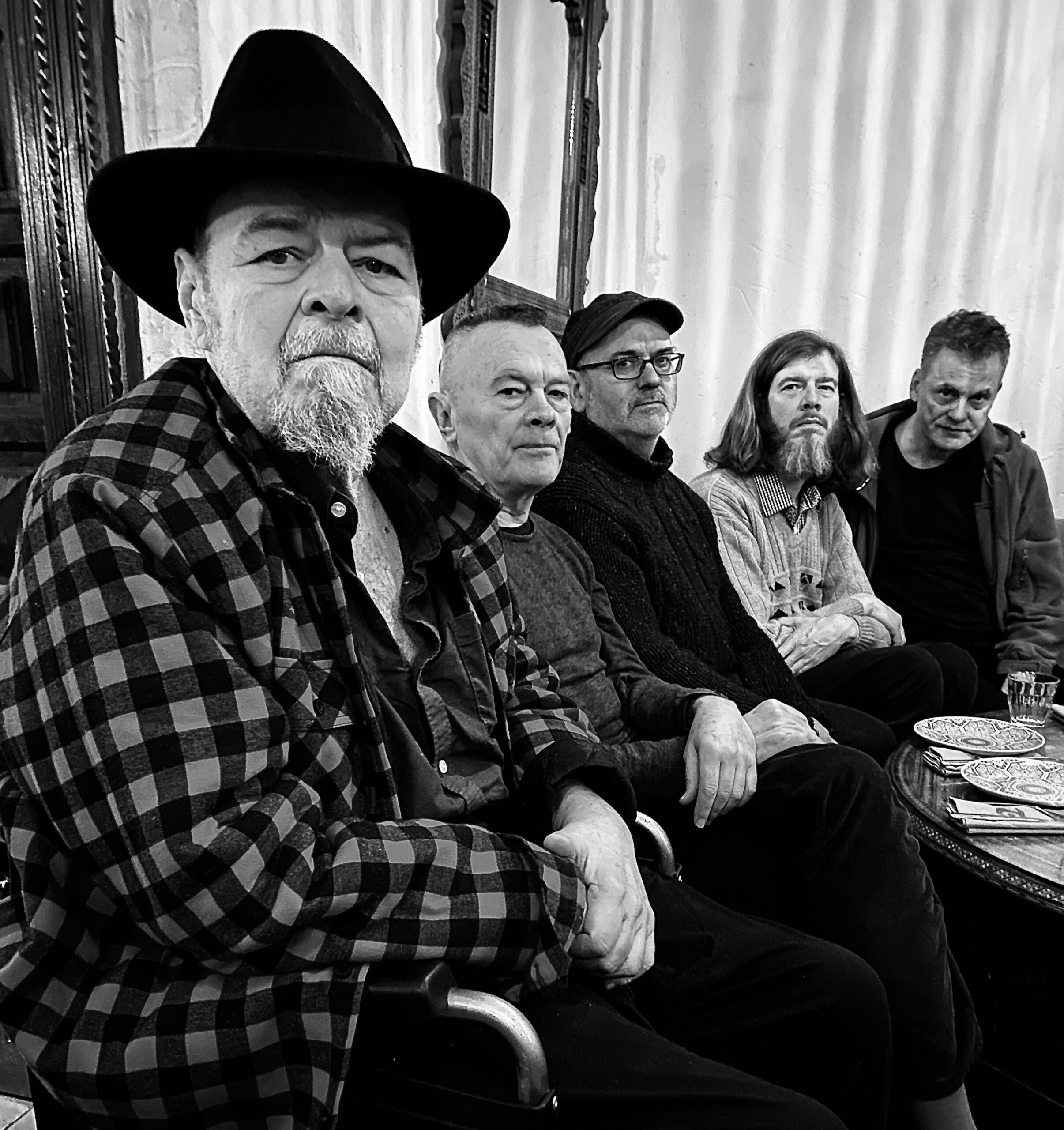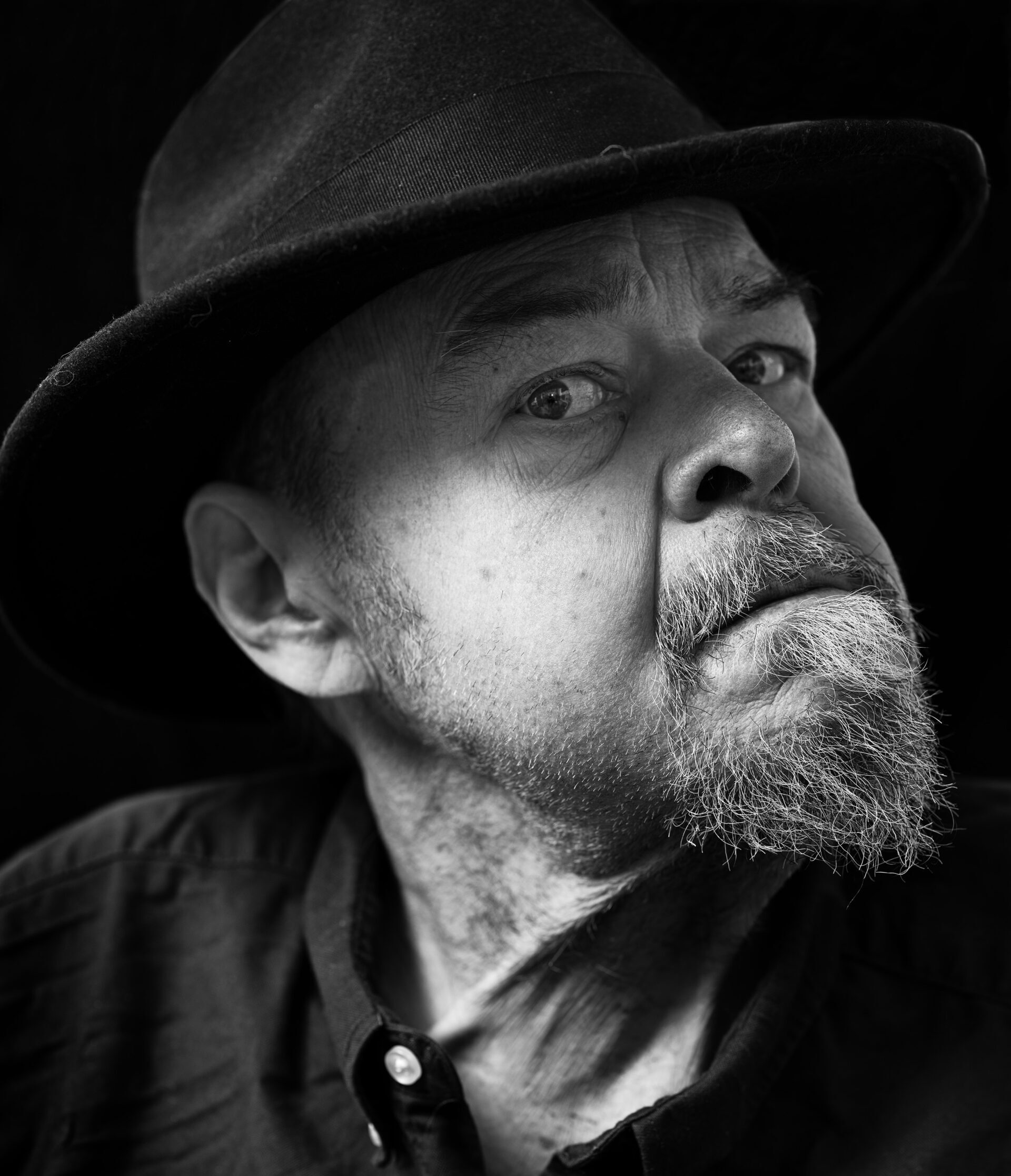DAVID THOMAS: PERE UBU – WORRIED MAN BLUES
The experimental art, noise group release the next chapter of their journey following 2019’s ‘The Long Goodbye’, which waved off the band’s first phase following a grand total of 18 studio albums. Pere Ubu now begin a new chapter and, almost 4 years on from their last album, founder and songwriter David Thomas brings together a fresh lineup to tell this story. The new record, ‘Trouble On Big Beat Street’, fuses noir-style cool jazz and Southern blues with hyperactive dance-pop rhythms and nonsensical lyrics that takes particular inspiration from David’s love of Beach Boys’ collaborator Van Dyke Parks and his definition of ‘The Song’. I speak to David about Van Dyke’s influence, driving around the blues trail in America, visa red tape and what’s coming up next for the band.
How long had you been working on this album since the last one?
Not that long. I think we started it last January; probably finished it somewhere over the summer. It takes a long time once we finished it to get it out. The last album, ‘The Long Goodbye’, was meant to wrap up all of the stories that Pere Ubu has been recording that made up the albums over the last number of years. I knew that we were going to start the ideas that we would start on the next project; the next chapter.
I thought about that for a while and in the end I settled on what Brian Wilson had showed back when he was doing ‘Smiley Smile’. He had just recorded ‘Good Vibrations’, which was still considered to be the perfect rock-pop single, and he knew that he had to create the perfect album for it to go on. He teamed up with Van Dyke Parks, started on it and received a lot of derision from the other members of the band, The Beach Boys. He had some problems with drugs and emotional issues and in the end, he abandoned the album/had it taken away from him. And in that process, he had in fact created the perfect album because, along the way, he recorded countless alternate versions of the songs with sections of the songs. I have many, many, many bootlegs of all of those, or most of those sections.
So he indeed did create the perfect album because it only exists in the imagination of the listeners to all of those bootlegs – ‘you’ve put this section because, oh, this section should go with that section and oh no, there’d be a third thing here’ and on and on and on, so you the listener creates the perfect album. Now later he did record ‘[Smiley] Smile’ with Van Dyke and in that this, ‘that’s this or that’ doesn’t really enter into the picture. I wanted to go about creating the perfect way of working, which would be as much as possible to create the space in the imagination of the listener.
You’ve been influenced by Van Dyke’s work for a long time. Why did it take you 53 years to define that?
Because things don’t all happen at once: it takes time and things need to be settled on. I started in on the current project back in the ‘90s with the band Dave Thomas and Two Pale Boys. The Pale Boys were assembled as the shock troops for Pere Ubu: I would begin to prepare Pere Ubu and my working methods and personnel for what eventually came. I worked over the long term; I’m not in the pop business: I assemble things step-by-step and proceed step-by-step.
Can you explain the recording process in how the band played each song once?
We got together; we did performances over our live streaming show DPK TV. We did some shows at Cafe Oto, a sort of improv club in London and we would just get together and create – that’s how it happened. Some of the songs were pulled from the Cafe Oto sessions; many were pulled from get- togethers for live broadcasts, live concerts on DPK TV and because I recorded everything, I took those elements and corrected them when needs be and then added some things here and there. That was basically it.
The tracklist is made up of 17 parts with the CD format. The extra tracks on the CD – what’s the significance of including those and did you debate about including them at all?
 We had to have the album out on vinyl. I’m not a big fan of vinyl but there you go, lots of people are. On vinyl there are time limitations: anything more than 20 to 23 minutes is really not good quality. I chose the 10 songs that would be the album, that would go on the vinyl release. Other various people in the band were concerned that the extra 7 tracks would just be lost and well, at that time, that’s what was gonna happen. Maybe one or two would show up somewhere along the way. But there was quite an impetus from everybody else to include them on the CD. Now what we did with that was that we gave the [record] company the right to put up the 7 songs on the CD, but they remain our property; they can’t do anything else with them. And they can’t charge more for the CD, because it’s got 17 songs. That was how we handled it. I didn’t particularly want to do it, but there really was a very strong feeling that they couldn’t be lost.
We had to have the album out on vinyl. I’m not a big fan of vinyl but there you go, lots of people are. On vinyl there are time limitations: anything more than 20 to 23 minutes is really not good quality. I chose the 10 songs that would be the album, that would go on the vinyl release. Other various people in the band were concerned that the extra 7 tracks would just be lost and well, at that time, that’s what was gonna happen. Maybe one or two would show up somewhere along the way. But there was quite an impetus from everybody else to include them on the CD. Now what we did with that was that we gave the [record] company the right to put up the 7 songs on the CD, but they remain our property; they can’t do anything else with them. And they can’t charge more for the CD, because it’s got 17 songs. That was how we handled it. I didn’t particularly want to do it, but there really was a very strong feeling that they couldn’t be lost.
Did you know what the main tracks were going to be?
It took me some time. I had 17 songs and I had to get it down to 10. I knew what the times were and I figured 10 songs is generally it. Some songs are obvious; others literally up until a few minutes before I sent it to the mastering engineer, I changed one of the songs, one of the 10. It took some time to sort through it; I was interested in the 10 songs chosen specifically telling the story that I wanted to tell and it was a very hard decision for some of them.
Do you mind if we talk about some of the tracks and what they’re about? For instance, what’s a ‘moss covered boodongle’?
I’m afraid I’m not really very good on that sort of thing. When I go about writing songs, I write a series of stories or I write one story from that story. I write the songs and sometimes there’s one or two songs per story and, other times, the whole batch of them is about that story.
“I’m not in the pop business: I assemble things step-by-step and proceed step-by-step.”
‘Worried Man Blues’ – you were telling a story at the beginning of that. Is there anything that influenced you with that specific track?
Yeah, that all derives from when I would just drive around in America. When it was particularly a time to write something, I would just spin off in the car and go places. That particular event comes from hours exploring US 49 in Arkansas and [I] crossed over the Mississippi at St. Helena: US 49 intersects Highway 61 in Clarksdale and Highway 61 and US 49 intersection is the crossroads that Robert Johnson and all kinds of blues people sang about. Now at the crossroads there is a Laundromat on one corner and across the street is a Popeyes fried chicken restaurant. So I just made the story, you go into the Popeyes and Bob Dylan and Alan Lomax are behind the counter; Muddy Waters is the manager and he’s bussing tables. You pull up to the speakerphone order menu and Howlin Wolf’ “how, how, how?” [is there]…that’s the story I came up with to describe my feelings about that event.
You included jazz and blues elements throughout the album. Was that a conscious thing because of the new lineup with Andy Diagram?
Each get-together we would improvise and sometimes it came out one way and sometimes it came out another way. There’s all sorts of things that never worked out and there were 17 things that did work out. We just created.
What happened with the lineup – Andy Diagram, Alex Ward and Jack Jones?
I ran across Alex because we have this live streaming show, DPK TV: people send things in and he had sent in a cover he performed of one of my songs, ‘[The] Long Rain’, and it was really good. I sent him a message saying, “Do you want to be in the band?” He’d been a lifelong fan and he said, “Yeah! I’d like to be in the band.” So he was in the band. Andy, as you know, I’ve worked with for decades in The Pale Boys; he’s been in and out of various versions of Pere Ubu at various times and I was interested in his input. So that’s how it came together. Jack Jones is just somebody I…
…met in a pub apparently?
Well, yeah. That’s literally true. Jack Jones is a fake name for somebody who doesn’t want to be identified.

You’ve got the Crocodile and Disasto tour dates this year including London and there’s US dates with Mike Watt and FaUST. What is you relationship with Mike Watt?
Mike and I are longtime friends. We’ve done some work together years and years ago. We would run into each other on the road and I’ve always enjoyed his work, his band, his performances.
Why were certain band members unable to tour in the US?
Because of the US visa restrictions! We started the process a long time ago. We were advised that we allowed plenty of time, but the time ran out, and basically it involved me spending $10,000 on the off chance on the best-case scenario of five days’ free time at the end of the process and that was just an impossibility; it just was not going to work. We’re going to keep trying for the US ban but now instead of seven months, we’re gonna leave nine months before we do leeway time – it’s just maddening.
It’s given you the opportunity as you said to ‘make Pere Ubu outside of America’…
The quote-unquote English band is Pere Ubu and I’m not devising an American band, but I’m working with some people who lead their own bands and we’ll create something pretty cool. I’ve worked with them all before so I know what I’m doing.
Your radio show, ‘Stay Sick, Turn Blue’, you started recently and interviewed Van Dyke Parks. What else can we look forward to? Who else have you got lined up for interviews?
We’ve got Mayo Thompson coming up next talking about psychedelics and Texas in the ‘60s; I’d like to interview Henry Rollins.
You released the ‘Nuke The Whales’ boxset and also have a Record Store Day release?
Yeah, well, that was running through box sets. I think we’ve completed them all now. So yeah I enjoy the process of preparing those things. ‘Ray Gun Suitcase’ is finally gonna come out on vinyl. As I said, I’m not a huge fan of vinyl but people like the stuff so that’ll be good to have.
Is there any other news on the horizon for Pere Ubu?
We’re always working; we’re always planning and devising things. We’re getting offers in for things around Europe over the summer and into the fall, so I imagine some of those will happen. Every day I fall further and further behind and we just keep plugging away and trying to get one thing done after another really. Hopefully we’ll have some more things after June in the UK. We’ve been wanting to do some more small places improv and maybe starting to work on the next album. We’re always on the lookout for something where we can just show up and play as opposed to making a big production with all that involves, which is fine, it’s just tiring to do the big production stuff. We’re looking at putting a little show together in Margate. But again, every day I fall further behind. It’ll show up some of these days.
Pere Ubu’s new studio album, ‘Trouble on Big Beat Street’, is out now and the band play the UK in June.
Photos © Brian David Stevens.
© Ayisha Khan.
